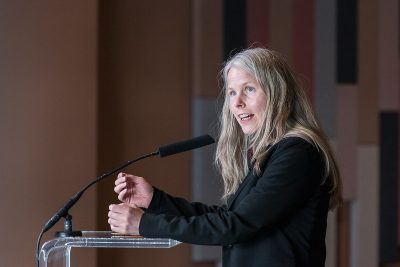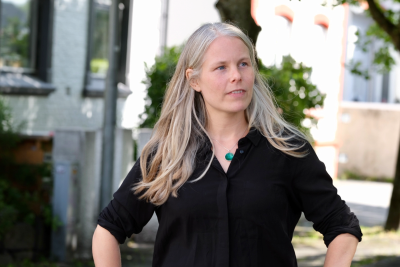Kirsti Bergstø, a 41-year-old left-wing politician from Northern Norway, is poised to take over as leader of the counry’s Socialist Left Party (SV). That can also force the Labour- and Center parties’ minority government coalition to take a wider left-turn, since it relies on SV for a majority in Parliament.

Bergstø suddenly emerged right after the holidays as SV’s top candidate to replace outgoing leader Audun Lysbakken, who recently became a father for the fourth time. After a decade at the helm, Lysbakken announced late last year that he now wants to spend more time with his family instead of devoting most of it to his work in Parliament, running the party and constantly negotiating issues with Norway’s left-center government.
There initially were three clear candidates to succeed Lysbakken, but fellow Member of Parliament Torgeir Knag Fylkesnes dropped out last fall, citing family preferences as well. That left Bergstø and Kari Elisabeth Kaski, one of SV’s brightest stars who’s been out on maternity leave for the past several months.
Kaski, also from Northern Norway but currently representing Oslo in Parliament, was widely favoured as SV’s most “pragmatic” politician: She’s been spokesperson for SV’s finance policy and several of SV’s most important county chapters supported her candidacy, so many that she was considered the most likely candidate to take over after Lysbakken.

Kaski was also viewed as being most able to get along with Labour’s Prime Minister Jonas Gahr Støre, and support his government if not even join it. Several political commentators in Norway claim that Bergstø, on the other hand, is not a “natural cooperative partner” for Støre’s troubled minority coalition with the Center Party, and could even topple it over certain issues.
“Audun Lysbakken has … managed to keep (the left-wing side of the party) under control and made SV a natural partner for Labour,” wrote Frithjof Jacobsen in newspaper Dagens Næringsliv (DN) earlier this week. “With Bergstø as leader, that time may be over.”
Kaski ultimately also backed out because of the time party leadership would take away from her own family and new baby. She wrote on social media just after New Year that opting against running for the party’s top leadership post “is a decision that makes me unhappy, but it’s the right decision for me in the situation my family and I are in right now.” She’d been expecting twins, but only one survived.
“The decision has been very difficult and taken time because…” Kaski wrote, “…so many in the party wanted me as leader. That’s an enormous vote of confidence … for which I’m very grateful.” But a political party, she wrote, “is never one person” and “building SV further is something we must do together. I look forward to get back to that when I return from leave on February 21.”
‘Enormous loss’
Some party fellows claimed Kaski’s decision marked “an enormous loss” for the party,” while Lysbakken himself claimed he was “sure her decision would be met with respect and understanding within the party.” Bergstø, at any rate, suddenly emerged as the top candidate as leader, and has support from party chapters in her native Finnmark, Rogaland and several other important districts around Norway.

“It’s most important that we have open and good debates,” Bergstø told newspaper Dagsavisen in December. “I want to continue to build a strong and effective socialist people’s party.” She thinks Norway needs “a strong leftist side that can take up the fight against inequality within power and wealth in society, and the serious situation regarding the environment.”
Bergstø also thinks SV should be “even more clear” about “cooperation with workers all over the country, in cities and rural areas. It’s important that SV (which currently holds around 7 percent of the vote) is strong and visible nationwide.”
Asked whether she wants SV to join the government coalition, Bergstø responded merely that “policy is more important than position” and that SV under her leadership “will work towards securing the most changes possible. It’s not a goal to be part of the government, nor to not be part of it.”
Consequences for the government
Commentators including Hege Ulstein in Dagsavisen think that with Bergstø as leader, any hopes that SV will join the government and give it a majority are “utopian.” Frithjof Jacobsen, commentator in newspaper Dagens Næringsliv (DN) predicts “chaos” on the left-center side: “Audun Lysbakken … managed to keep the (anti-NATO and anti-EU) flank within SV under control and made SV a natural partner for Labour. With Bergstø as leader, that time can be over.”
Now the campaigns for SV’s deputy leaders are underway. Fylkesnes, also from Northern Norway, wants to be re-elected but the race is on to replace Bergstø as his fellow deputy leader. Top candidates are environmentalist Lars Haltbrekken (former leader of Norway’s chapter of Friends of the Earth), Ingrid Fiskaa (a former state secretary in the foreign ministry during the Labour-Center-SV coalition that held power from 2005 to 2013) and Grete Wold from Vestfold, who wants to turn SV into “a broad and good people’s party” with competence within climate issues.
Decisions on all the top spots will be made at the party’s annual meeting in March.
NewsinEnglish.no/Nina Berglund

